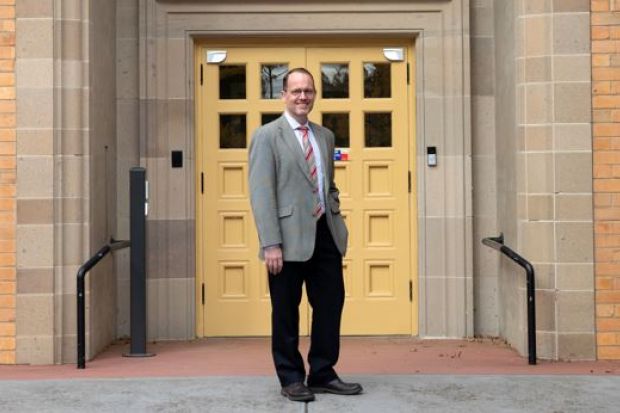Having added three colleges in three states to its “federation” in just three weeks, Australia’s only theological university is eyeing a new role as professional educator for carers, teachers and nurses.
In what seems like the blink of an eye, the 112-year-old University of Divinity has boosted its membership by 30 per cent. In late August, Perth’s Wollaston Theological College, which specialises in training lay and ordained Anglicans, was announced as the institution’s newest provider and its first in Western Australia.
By 12 September, two more members had joined the fold. The Uniting College for Leadership and Theology became Divinity’s second constituent in Adelaide, and Brisbane’s St Francis College became the first in Queensland.
Divinity’s empire now stretches from the Pacific to the Indian seaboards, embracing five states – it already had a college in Sydney and eight in Victoria – and eight denominations.
The rapid expansion marks the latest stage of an institutional evolution that has been anything but orthodox since it opened its doors as the Melbourne College of Divinity (MCD) in 1910.
At the time, Australia’s five existing universities excluded theology from their curricula over doubts about its legitimacy as an academic discipline and fears of fuelling sectarian divisiveness – a situation that prevailed until newly established universities began teaching religious studies from around the 1950s.
The Sydney-based Australian College of Theology (ACT), founded by the Church of England in 1891, could only offer certificates and licentiates. But a “very unusual” act of Victoria’s parliament authorised MCT to provide academic degrees from the outset. It is thought to be the world’s oldest stand-alone degree-granting body in theology.
And it was established by an “ecumenical coalition” of six denominations, unlike ACT, which catered exclusively to Anglicans until the 1960s.
A 1972 revision to MCD’s act brought the Roman Catholic Church under its representation. “For one of the first times in world history, we had Catholics and Protestants cooperating to deliver theological awards,” said vice-chancellor Peter Sherlock. “Given the Troubles in Northern Ireland, that was huge.”
In 2012, the institution notched another first with its elevation as Australia’s only “university of specialisation”. It became a fully fledged university after a 2019 review recommended a rationalisation of institutional categories.
The university badge proved a draw card for the three new colleges, which Divinity said had undergone “rigorous assessment” to demonstrate their academic, governance and financial capabilities. The opportunity to share services also proved attractive.
The new alliances also reflect universities’ “general retreat” from theological education, much as they are moving away from teaching languages and creative arts. Professor Sherlock blamed “economic pragmatism” among both universities and the churches they often engaged as industry partners. “We are providing, I think, a more natural home for those relationships.”
But Divinity’s traditional core business is losing community appeal. Last year’s census found that the proportion of Australians identifying as Christian had plunged by 28 per cent in a decade.
Even with its new members, Divinity has fewer students than any Australian university other than Avondale University, which achieved full university status last year. Professor Sherlock estimated that the additions would increase enrolments to about 1,650.
But in a “shrinking market”, the additional colleges help sustain “a critical mass” of people studying fundamental theology or preparing for Christian ministry or posts as hospital or prison chaplains.
They also give a historically Melbourne-based institution a presence in five states. “One of our colleges offers an award in counselling that the rest of our colleges don’t. It can now offer that award through the campuses of our interstate colleges,” Professor Sherlock said.
The change also boosts access to prospective partners in a sector increasingly selling itself on the earning power of its graduates.
“Our graduates are highly motivated vocationally, but most of them are going into – frankly – pretty low-paid jobs,” Professor Sherlock said. “They’re doing it out of…a call from God and a passion for what they do, which is fabulous. But…how do we take that wisdom, that ethical insight, that philosophical enquiry and bring it to bear in other areas?
“The obvious ones are things like community services, health [and] education because those are the areas where…the faith-based agencies are absolutely flourishing.
“In every state the Catholic, Uniting, Anglican, Baptist, Lutheran churches, etc, all have an education arm, a health arm, an aged-care arm, a social services and community services arm. That creates the potential for some very exciting partnerships that can operate across multiple organisations [and help] resource people’s training needs.”
He said the university’s act already allowed it to offer social work, nursing and teaching degrees. “We’d just need to go and have a conversation with [higher education regulator] Teqsa about whether we did that as a self-accrediting authority or whether we got them to approve it.”
Although this “may not happen very soon”, it would be a “natural” move that reflected medieval European universities’ evolution from religious roots. “How can we take the wisdom of millennia that we embody? In time, that’s going to mean moving into some of those other areas which might more transparently lead to a job.”
POSTSCRIPT:
Print headline: Theological university grows into new role
Register to continue
Why register?
- Registration is free and only takes a moment
- Once registered, you can read 3 articles a month
- Sign up for our newsletter
Subscribe
Or subscribe for unlimited access to:
- Unlimited access to news, views, insights & reviews
- Digital editions
- Digital access to THE’s university and college rankings analysis
Already registered or a current subscriber? Login










